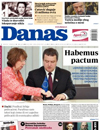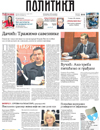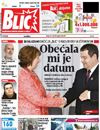The accord which will effectively clear the way for Serbian accession to the Union, is both a de facto recognition of Kosovo by Belgrade and a major success for European diplomacy, which has been lacking in visibility.
“Habemus pactum,” announces the weekend edition of Danas with triumph. “All is well that ends well,” remarks the daily, which highlights the historical importance of the Brussels agreement, which has come as the result of months of negotiations —

… because it will help put an end to the conflict in Kosovo and open up new perspectives for a jaded Serbian society.
Receive the best of European journalism straight to your inbox every Thursday
While nationalist press titles, such as Nase Novine, speak of Serbian “capitulation”, Politika argues that in signing the agreement with Pristina, “Belgrade has chosen future.” For the Belgrade daily —

… Serbia will have to take stock of what has been gained and what has been lost, but, clearly, it [the agreement] amounts to break with a series of defeats, which began, much to the incomprehension of the world and Serbia’s entourage, with the denial of a reality that did not sit well with the country’s mythical past, and continued with a refusal to compromise that paved the way for major and minor “capitulations”. […] Using the means that have been authorised by the international community, Serbia will now have the opportunity to take charge of health, education, and economic development for Serbs living in Kosovo.
For Blic, Prime Minister Ivica Dačić and deputy PM Aleksandar Vučić have opted to follow “the only” possible path, which is the one that will lead “Serbia onto the road to the EU.” Credit is also due to the EU High Representative for Foreign Affairs, Catherine Ashton, who “finally broke the long series of failures to reach agreement with the Serbian government which had sidelined the EU accession process.” As for Dačić and Vučić, the newspaper points out that —

… they have succeeded in convincing the principal opponent of the EU in the ruling coalition, President Tomislav Nikolić, that the agreement with Kosovo is not a defeat. Their transition from hardline socialism and nationalism to pro-European politics was quick and effective, to the point where they won the hand in this particular game of poker.
The accord signed in Brussels also amounts to a major success for the European Union, and in particular for Catherine Asthon, notes Jutarnji List in Zagreb. The newspaper continues —

Even though she was unable to recognise Serbian President Nikolić in a delegation from Belgrade at the beginning of her mandate, she nonetheless succeeded in doing something her predecessors were unable to do: she convinced Belgrade that the prospect of a European future should not be sacrificed for Kosovo. It is all the more significant that this demonstration of soft power has come at a time when the EU appears less attractive in the context of the economic crisis.
In Kosovo, Gazeta Shqip hails "a historic agreement," which —

… for the first time, gives Albanians control over our destiny as well as our territory and borders. […] Serbia’s signature of the agreement amounts to de facto recognition of the state that has broken away from it. […] From now on, there will be two Albanian states in the Balkans, both of which will offer their peoples the opportunity to demonstrate their commitment European values through the construction of functional democracies and respect for the rule of law.
Although Express acknowledges that the agreement “has created the opportunity for the legal and political integration of northern Kosovo without legally or politically undermining Pristina,” it nonetheless argues that —

… it would be foolish to believe that it will be accepted without dispute or tension by the Serbian majority in the four municipalities in question. Differences in outlook can only be addressed by political and organisational partnerships between Pristina and the West, which are the only means to forestall Serbian attempts to irremediably undermine the agreement, whose destiny will depend on its complete application.
On the same wavelength, Koha Ditore argues that the Brussels agreement will have no impact on the current deadlock in Kosovo —
Neither formal Serbian recognition, nor a seat at the UN will be of use to Kosovo if it is still unable to function as a normal state. In conserving executive power in the Serbian majority municipalities, Belgrade will still be able to sabotage any reforms in Kosovo, and effectively undermine the Kosovar state.
Was this article useful? If so we are delighted!
It is freely available because we believe that the right to free and independent information is essential for democracy. But this right is not guaranteed forever, and independence comes at a cost. We need your support in order to continue publishing independent, multilingual news for all Europeans.
Discover our subscription offers and their exclusive benefits and become a member of our community now!












